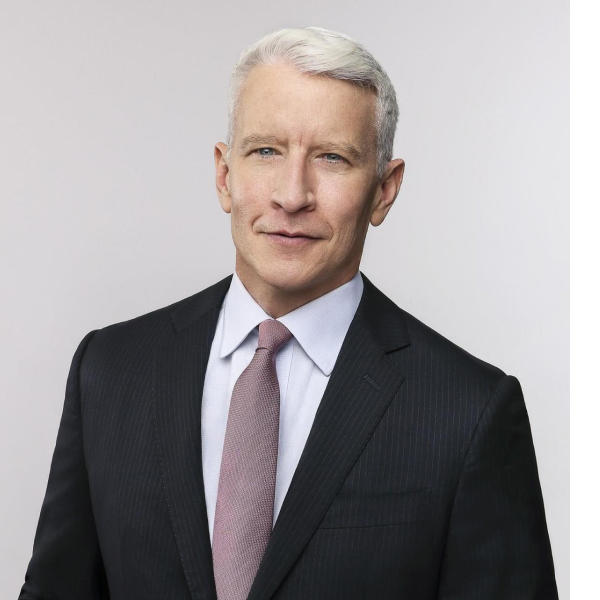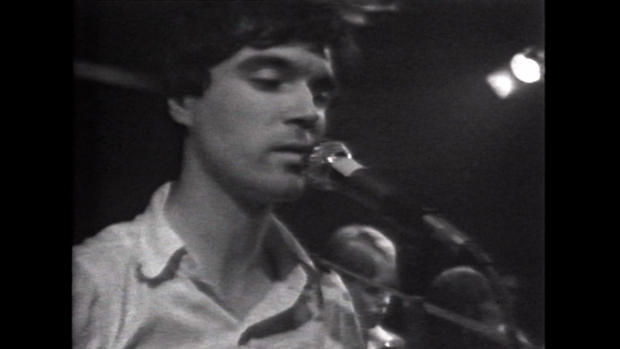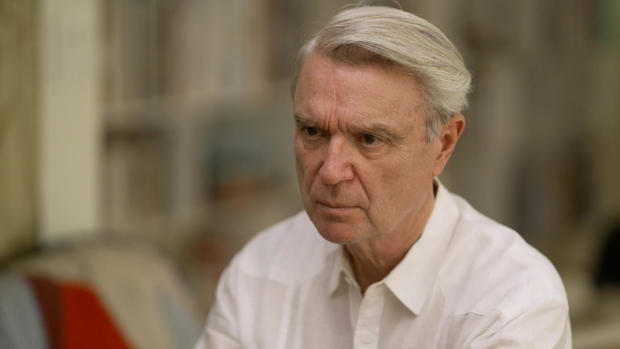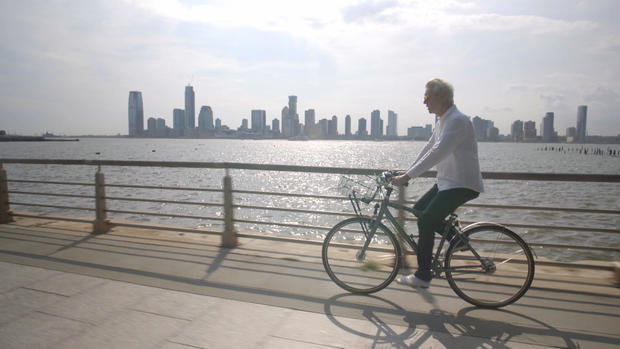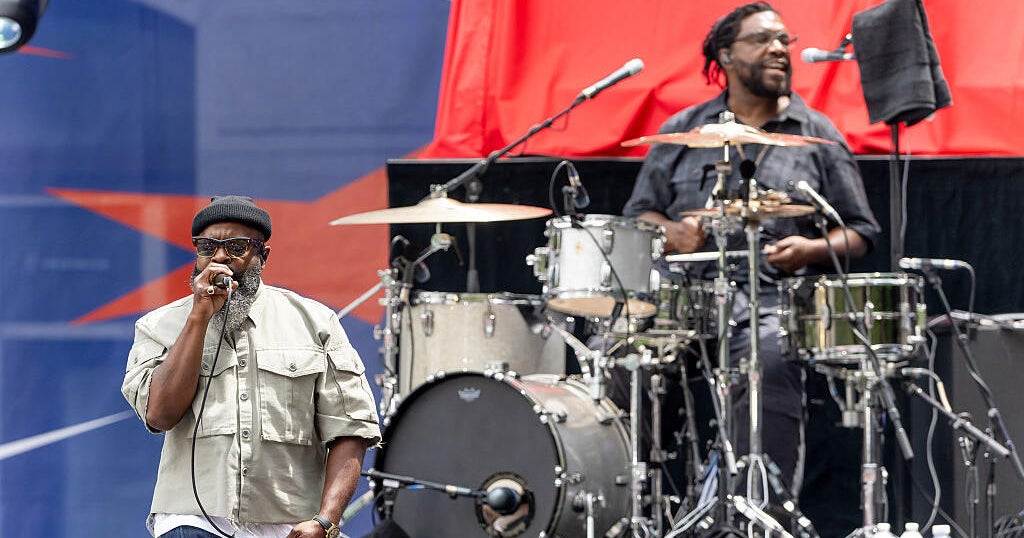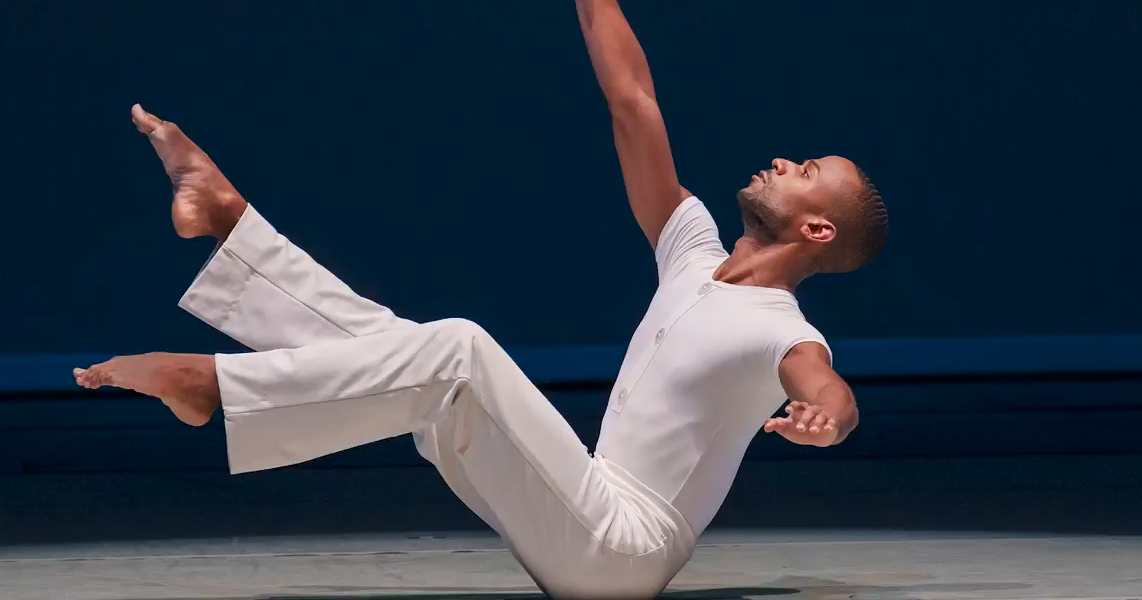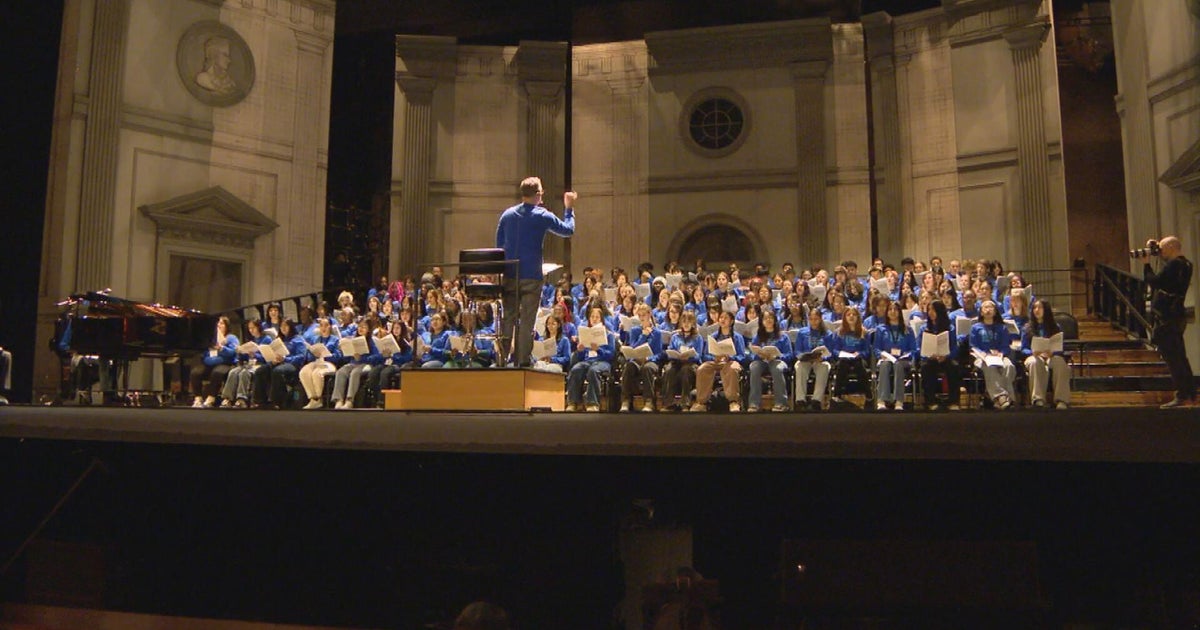David Byrne on Talking Heads and following his own beat
You probably know David Byrne as the lead singer and songwriter of Talking Heads, the hugely influential post-punk rock band of the late 1970's and 80's. They broke up more than thirty years ago, but Byrne has been on his own eclectic journey ever since. His artistic innovations have blurred the boundaries of music, theater and art. He's won an Oscar, a Grammy and a Tony, toured with salsa singers, collaborated with neuroscientists, made movies, and has just been nominated for another Oscar. Now 70, David Byrne is as creative, energetic and unusual, as he was when he was 23, an art school dropout, just starting to perform onstage with his friends as Talking Heads.
David Byrne at CBGBs in 1975: The name of this band is Talking Heads and the name of this song is Psycho Killer…
David Byrne: So I wanted to be very matter of fact. It's not like, "Are we havin' fun tonight?"
Anderson Cooper: There's none of that, "How are y'all doin?"
David Byrne: How are you all doin'?
BOTH: New York!
This is one of David Byrne's first performances. It was 1975 at CBGBs, the legendary music club where the Ramones, Patti Smith, and Blondie were also just getting started.
Psycho Killer was only the second song David Byrne had ever written. And it was Talking Heads' first hit.
Anderson Cooper: When you hear it now, what do you think?
David Byrne: I'm glad I did it. But I'm also glad that I didn't stick with that as my-- oh, like, "This is working. Let's do more like this." I'm glad that I decided, "No. Now you have to do things that are a little more original musically.
And that's exactly what he did. Along with Tina Weymouth, Chris Frantz and Jerry Harrison, Talking Heads put out eight albums over the next 13 years.
They were edgy, groundbreaking, critically acclaimed and a commercial hit.
Melding rock with funk, disco, afro-beat and the avant-garde.
They'd all studied art in college and it showed in their music videos which were in heavy rotation on MTV.
Byrne's quirky movements and manner got most of the attention.
Which was not always easy for the introverted singer. Dick Clark tried to ask him about it on American Bandstand in 1979.
Dick Clark on "American Bandstand": Are you a shy person?
David Byrne on "American Bandstand": I'd say so…
Anderson Cooper: It seems contradictory to a lot of people, the introvert who winds up on a stage in front of thousands of people performing and reaching great heights.
David Byrne: It does seem contradictory, but in retrospect it makes perfect sense. Your way of announcing your existence and communicating your thoughts to people is through performance, and then I could retreat into my shell after that. But I'd made myself known to these people, what I was thinking, what I was feeling. So when that's your only option, it's a life saver.
David Byrne's shyness goes way back. He was born in Scotland, but his family moved to Baltimore when he was eight. His accent was so thick, classmates could barely understand him. He was an outsider, happier making music at home in his basement with a reel-to-reel tape recorder than hanging out with other kids.
David Byrne: My discomfort with kind of social situations meant as often happens I would focus intently on my drawings, or learning to play other people's songs, or things like that. And that continued for ages. And you'd kind of ultra-focused. So that becomes-- well, kind of a superpower.
Ultra-focused may be a superpower, but it caused problems between Byrne and the band that flared up on tour in 1983.
David Byrne: I became, I think, kind of obsessive about getting that show up and running. I might not have been the most pleasant person to deal with at that point.
Anderson Cooper: Demanding.
David Byrne: Yes. Yes.
Byrne commanded center stage, famously wearing this outrageously oversized suit.
The show was made into a film by director Jonathan Demme called Stop Making Sense. It's considered one of the greatest concert movies ever.
Talking Heads made three more albums, but Byrne was increasingly branching out on his own.
David Byrne: As I became more relaxed as a person, started writing different kinds of songs, songs that maybe weren't quite as angst ridden and peculiar, some fans were probably disappointed, you know? "We liked the-- the really quirky guy." Or, "We liked the guy who was t-- really struggling with himself and really having a hard time." And I thought, "Why would you wish that on me? For your own amusement, right?
In 1988 he founded a world music label.
Then released an album of Latin songs and wrote music for films, dance companies and experimental theater.
David Byrne: I genuinely started having other kind of musical interests.
Anderson Cooper: You'd started to collaborate with a lot of artists from different genres.
David Byrne: Yes. And-- and I thought, "I want to do more of that. And by then it was pretty much over.
There was never an official announcement, but eventually Byrne made an off-hand comment to a reporter that Talking Heads had broken up. He neglected, it seems, to tell the band.
Anderson Cooper: Members of the band said that-- that you never actually talked to them and said that the band was over. That they read about it in a newspaper.
David Byrne: I don't know if that's the case. But, well, it might be. And I think it is very possible that I did not handle it as best as I could.
Byrne never looked back, and he's followed his own beat ever since, no matter how off-beat it may be.
Ten years ago, Byrne staged a pop opera in collaboration with Fatboy Slim called Here Lies Love. It's about, of all people, Imelda Marcos, the wife of the former dictator of the Philippines. It's now scheduled to open on Broadway this summer.
When he became fascinated with high school color guard teams in 2015, he wound up staging arena shows combining the teams' flag spinning, weapon tossing and dance to the pop music of Nelly Furtado and St. Vincent.
David Byrne: I thought, "Oh, this is just gonna be highlighting their talent and putting people together who would never normally be together." And it wasn't until I saw the show and I realized, "This is-- this is not about that at all." What it's really delivering is this message about inclusion. That's what this is about. They kind of revealed it.
Anderson Cooper: But isn't that extraordinary that, you can start doing something with one thing in mind, and yet it has a life of its own.
David Byrne: I trust-- what I do and what other people do that way, that it's gonna deliver what it wants to say. But someone else looking at it could go, "What are you talking about? You don't know what you're doing? You don't know why you're doing it? You don't know where it's gonna end up? I just kinda trust it, yeah.
He has a small studio in his New York City apartment where he tinkers with lyrics and new ideas. Much like he did all those years ago in his parent's basement.
David Byrne: The first stanza sounds like it might be promising.
Anderson Cooper: Do you stop and kinda ruminate on things and come back to it an--
David Byrne: Yeah, I might see if I get, like, a chorus or something. I might try, like, a chorus.
Byrne is the quintessential New Yorker. He's lived in the city for five decades, and it's not uncommon to see him pedaling around on his bicycle. He is, it seems, always on the move, always exploring.
His downtown office is lined with books, records and odd mementoes he's picked up here and there.
David Byrne: This wonderful wine from Turkmenistan.
Hidden amid the clutter, there's a Grammy and his 1988 Oscar for composing the soundtrack for the film "The Last Emperor."
David Byrne: It's not on the lowest shelf.
Anderson Cooper: I mean, David. Really. Does the Academy know about this?
David Byrne: You know when you go into somebody's office and they have all their awards--
Anderson Cooper: Yes, it's--
David Byrne: All framed all around them?
Anderson Cooper: Yeah, or magazine covers or--You don't -- you don't have an ego wall.
His office is where he runs Reasons to be Cheerful.
An online magazine highlighting creative solutions to complex problems, from reinventing food banks in Chicago to turning French parking lots into solar farms.
Anderson Cooper: So are there reasons to be cheerful?
David Byrne: Oh, yeah. Yeah, yes. If you get up in the morning and start doom scrolling through your phone or your tablet or laptop or whatever, you're gonna think, "No, no, no, no, no. World's going to hell in a handbasket." But-- there are people and places, organizations doing things that are really making a difference finding solutions to things.
That optimism infused a hit Broadway show Byrne created and starred in called American Utopia.
David Byrne: It's actually like the performance branch of Reasons to be Cheerful. This is really about-- hope and possibility and what-- how we can work together as people.
He mixed his old songs with new ones.
Byrne wanted the musicians to be completely untethered. Allowing them to move freely around the stage. It was less a Broadway musical, more a raucous revival.
David Byrne: There's this amazing feeling when-- music like that is all around you, when there's a whole group of people who are makin' the music.
David Byrne: It's not just, like, one soloist or something like that. It's this collective thing that gives it this extra energy.
Byrne's latest theatrical experience may be his most unusual yet. It's an interactive journey into his past called Theatre of the Mind, produced in collaboration with the Denver Centre for Performing Arts. Audience members get random name tags and are led on a semi-autobiographical tour of Byrne's memories… like an out of proportion kitchen, that makes anyone in it feel like a child.
The show is full of surprises the audience takes part in… some of them based on neuroscience experiments. We agreed not to give them away, but they make you question your own perception and perhaps your memories.
Theatre of the Mind ends in a replica of his parent's attic. Like Byrne's life, the show tells a story about how over time our identities are malleable and how we all have the capacity to change.
Anderson Cooper: I like that idea that you can change your story. You can change the narrative.
David Byrne: It would be a horrible world if people never changed for their entire life. Or they were-- they were an angry person, or upset person, or depressed person and it's, like, that's your fate. But that's not true.
Anderson Cooper: Do you think you've changed that much?
David Byrne: I feel like, yeah, I'm a very different person than I was when I was young.
Anderson Cooper: Were you conscious of those changes?
David Byrne: Sometimes my friends would say, "You're really different than what you used to be when I first met you. You're a really different person now."
Anderson Cooper: By the way-- were they saying that in a nice way? Or was that being yelled out of the top of their lungs?
David Byrne: No. It was a nice way. It was like, "Wow, you've really changed."
Produced by Michael H. Gavshon. Associate producer, Nadim Roberts. Broadcast associate, Annabelle Hanflig. Edited by Daniel J. Glucksman.
